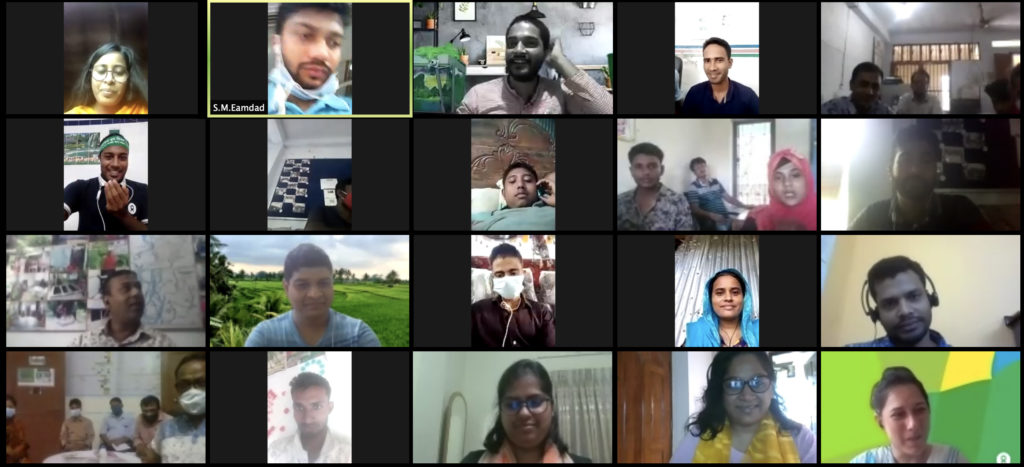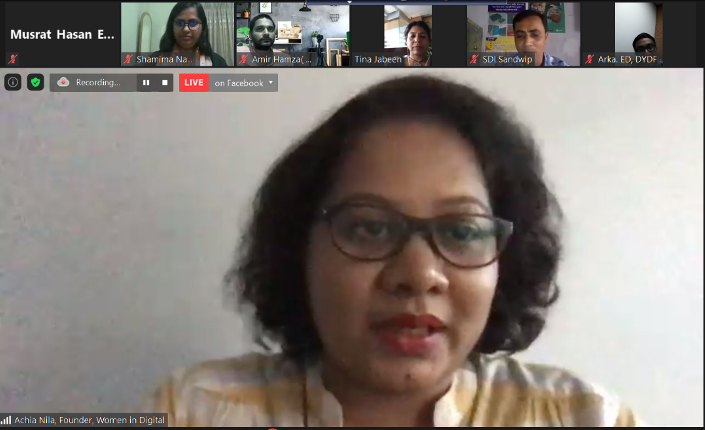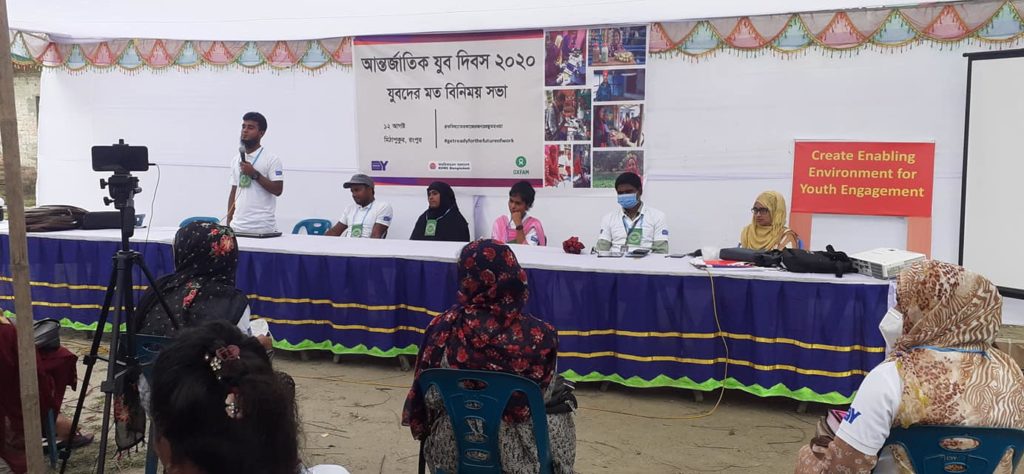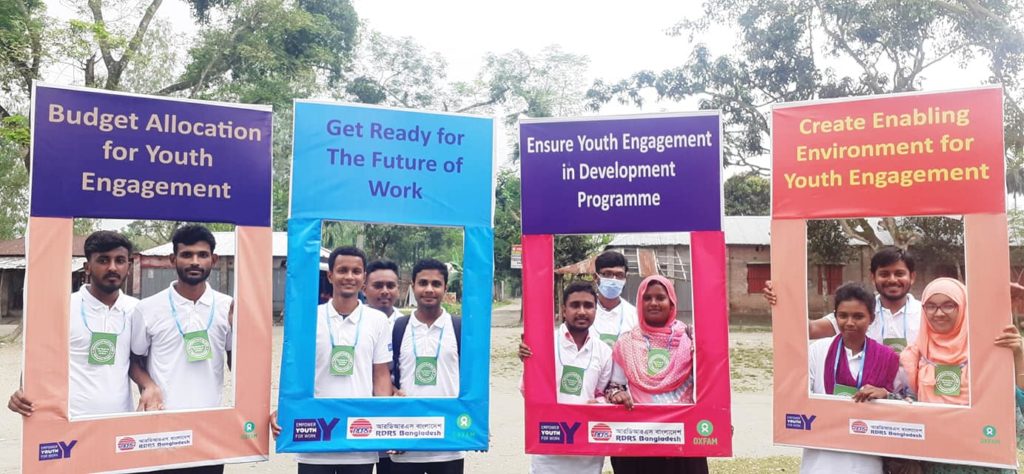International Youth Day in Bangladesh 2020
Oxfam in Bangladesh, young people and partners observed International Youth Day 2020 with a wide range of activities. These reflected the overarching theme “Youth Engagement for Global Action”; they also provided an opportunity to engage youth and decision makers on EYW’s findings on the Future of Work, address inequalities and put forward recommendations to improve youth employment today and in the future.
Future of Work webinars
Today, 13% of digital jobs worldwide are filled by Bangladeshi citizens – a huge contribution to the global marketplace. Yet in 20 years’ time, it is predicted that 5.5 million people in Bangladesh could lose their jobs as a result of automation. How can young people prepare themselves for such a fast-changing labor market?
On International Youth Day, more than 100 Bangladeshi youth took part in webinars and online consultations with representatives from government and ICT firms, agriculture experts and entrepreneurs to map out these changes and identify opportunities together. Among the questions posed were how do young people – especially young women – gain better access to employment? What options does the government offer? The discussions kicked off with presentations by Oxfam and partners, who shared the main findings of the Future of Work research.

In Barishal district, Md. Jayed from Garuria Union said, “The government should take more initiatives to increase the use of modern technology in agriculture, and provide loan with easy terms for young farmers. We also need to put modern agricultural methods and practical sessions on our national curriculum to encourage students to be part of agri-industry.” Tina Jabeen, an Investment Advisor with the government’s ‘Startup Bangladesh’ program, advised young people: “Don’t do business in a hurry. You should only do business which has a potential market. You always need to have a plan and a backup plan, so you can prepare yourself for any kinds of risk.”
The importance of having a strong social media presence was emphasized by Achia Nila, Founder and CEO of Women in Digital: “A proper mindset, goal setting and having an alternative plan to manage risks are key to setting up a business. Don’t follow others – set your own rules, and assess the need for the business before moving into it. Think about how you can promote your business on a digital platform, as this is the key to growing it.”

Young people talked about their experiences and asked for the support they need to succeed in business. Youth entrepreneur Hafizur Rahman highlighted the crucial role of cheap and reliable internet access. She also called on the government to provide follow-up support as well as initial business training, and to ensure there are more opportunities for rural youth. As another young person put it: “To become an entrepreneur, we need a package that allows us to develop our skills, take out loans easily, access information and much more.”
Rangpur and Khulna also organized offline consultation meetings with the participation of government officials, businesspeople and academics, and around 120 young people.
Campaigning against Covid
In Khulna and Barishal, youth continued their local campaigning on Covid-19 prevention. They distributed masks and soapy water in their neighborhoods – prioritizing local vehicle drivers and shopkeepers, who come into contact with large numbers of people and are therefore at more risk of contracting and spreading the disease. The youth groups from Barishal set up hand sanitizers on local buses, auto rickshaws and vans so that passengers can sanitize their hands before and after their journey, and in grocery shops in the village markets. Youth group members from Khulna distributed 400 masks around the community.

On the airwaves
On 12 September, EYW youth groups from Rajshahi organized a discussion session on the community radio station, Radio Padma 99.2. Two female and three male youth shared the findings of the Future of Work report, analyzed the current state of rural youths’ skills and talked about the possibilities for taking advantage of global opportunities in the era of the ‘Fourth Industrial Revolution’. The event was broadcast on the airwaves and on Facebook live, reaching 92,695 viewers or listeners. This gave young people a voice to express what they need to overcome the challenges the face and seize the opportunities that the changing labor market will bring.
Protective planting
Young people of Barishal and Rajshahi also celebrated International Youth Day with a tree-planting event, which was supported by representatives oflocal government, youth development offices and the wider community.
During Cylone Amphan in May 2020, trees and other vegetation played a vital role in minimizing the loss of life, livestock and property; the government thus appreciated the young people’s efforts to protect the environment, and donated tree seedlings for the event.
There was another reason to celebrate on International Youth Day, as Belpukuria Youth Group from Rajshahi district received formal registration from the Department of Youth Development. This means the group can directly access government grants for youth development, take part in meetings and contribute to decisions affecting young people – ensuring that young people’s voices will be listened to today and in the long term.
“Nothing about us, without us”
The Asian Regional Youth Dialogue Session on Oxfam’s Youth Engagement Plan was held on 24 August to coincide with International Youth Day events. This initiative by Oxfam’s Youth as Active Citizens (YAC) community aims to explore how Oxfam can better partner with youth movements and more meaningfully include young people in its work. The session aimed to share and discuss the key findings of Oxfam’s new youth engagement report; to open a space for “courageous conversations” about the state of youth engagement within Oxfam’s work on climate change; and to allow ideas to emerge on how Oxfam can strengthen its work with youth in climate action and influencing. Twenty-five young leaders from different regions of Bangladesh, India, Indonesia, Nepal and Pakistan joined the session, united by the common spirit “Nothing about us, without us” and their shared commitment to global action.

